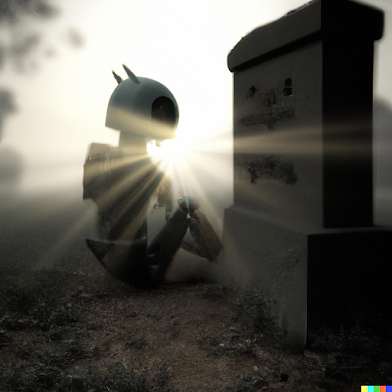A few years back I read a news story in which some leading climate scientist pointed out that human beings could always, as a last-ditch fix for global warming, send up rockets full of bazillions of grain-of-sand-sized mirrors to explode at the edge of space and fill the upper atmosphere with said contents, effectively preventing x percent of the sun's rays from hitting the earth and so cooling things off for us earthlings more or less instantly.
Asked why we're not simply doing this already, the climate scientist made a surprising (I thought) answer.
The bazillion-tiny-mirrors fix would meaningfully and maybe semi-permanently change the appearance of the sky.
The sky. The thing we've always lived under, blueness and brightness of which have been etched on human (and, no doubt, animal) consciousness for many, many millennia.
I find myself thinking about this when I ponder recent astonishing advances in AI.
Just as human beings have always had a bright blue sky to live under, they've always had the biggest intellects on the block.
We're living, here in the 2020s, at the very moment at which the sky is going to change.
Soon AI won't just do math and play chess and fold proteins and design buildings and play the stock market and make art and compose music and perform music better than human beings can hope to; it'll even (nakedly privileging my own academic field) write literature better than humans.
No kidding: unless there is a moratorium on AI tech all kinds of soon (I'm not holding my breath: if there's anything being an American for more than a half-century has taught me, it's that money gets what money wants—and it wants AI), ChatGPT will soon, if simply asked, crank out brand-new Vladimir Nabokov novels all day long.
And some percentage of those (if anyone has the time or inclination to read them) will be blastingly excellent.
Same as Lolita.
Same as Pale Fire.
We're about to be the second-smartest things on the planet.
We're about to be handed, for the first time ever, the second fiddle.
How many years will we be able to keep telling ourselves we're the bosses around here once a clearly, plainly, obviously superior alien intelligence has settled in and made itself nice and comfy? As it's already halfway done?
Is that the wrong question to ask?
How many months?
How many weeks?
What is the second-fiddle part, exactly? How does it go?
Will AI be writing the sheet music?


